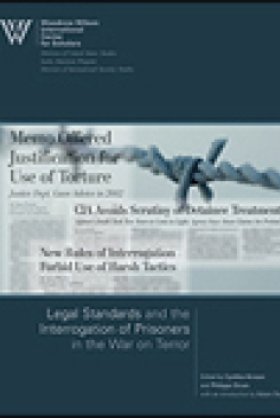Legal Standards and the Interrogation of Prisoners in the War on Terror


The question of the use of aggressive interrogation methods with prisoners suspected of terrorist activities is clearly an important one that will continue to be discussed by policymakers and the general public. In June 2007, in the hope of contributing to that discussion, the Woodrow Wilson International Center for Scholars' Division of United States Studies, Latin America Program, and Division of International Security Studies convened a conference on the subject.
The event consisted of two panels. The first was devoted to an exploration of the views within the U.S. government—the Congress as well as the executive branch—about the legalities and the utility of coercive techniques. William Taft IV, former Legal Advisor to the U.S. Department of State; Seth Stern, legal affairs reporter for
Congressional Quarterly; and David Rivkin, former Legal Advisor to the Counsel to the President, discussed the evolution of views within their departments and current interpretations of U.S. and international law.
The second panel, featuring Amrit Singh, staff attorney at the American Civil Liberties Union; Tom Parker, a former counterterrorism official in the United Kingdom; and Juan Méndez, president of the International Center for Transitional Justice, examined views outside the government, including those from United States non-governmental organizations, Latin America, and England/Ireland.
What follows are the slightly edited presentations made at the conference.The comments and exchanges among the panelists themselves, as well as the discussions with the audience, are also included. These exchanges reflect the ongoing controversies generated by the issue of the treatment of detainees, as well as the passionately-held views on both sides of the debate.
Authors


Former Director, Division of United States Studies, Woodrow Wilson Center

Latin America Program
The Wilson Center’s prestigious Latin America Program provides non-partisan expertise to a broad community of decision makers in the United States and Latin America on critical policy issues facing the Hemisphere. The Program provides insightful and actionable research for policymakers, private sector leaders, journalists, and public intellectuals in the United States and Latin America. To bridge the gap between scholarship and policy action, it fosters new inquiry, sponsors high-level public and private meetings among multiple stakeholders, and explores policy options to improve outcomes for citizens throughout the Americas. Drawing on the Wilson Center’s strength as the nation’s key non-partisan policy forum, the Program serves as a trusted source of analysis and a vital point of contact between the worlds of scholarship and action. Read more




